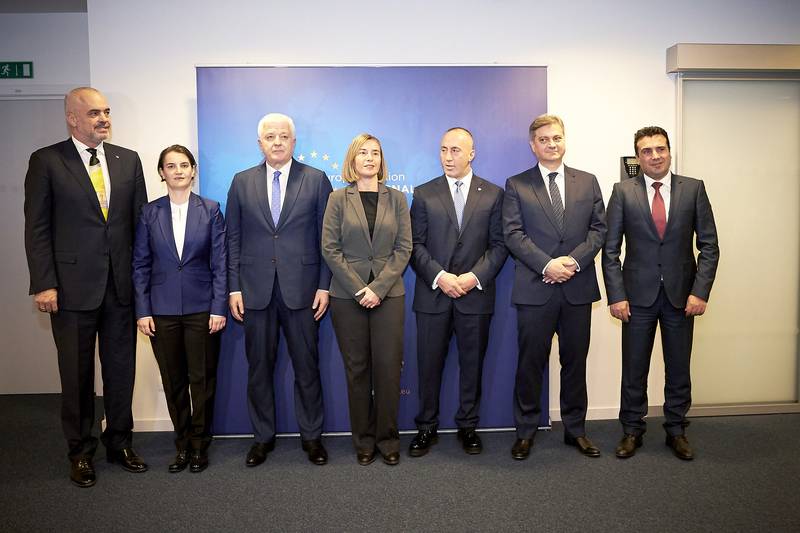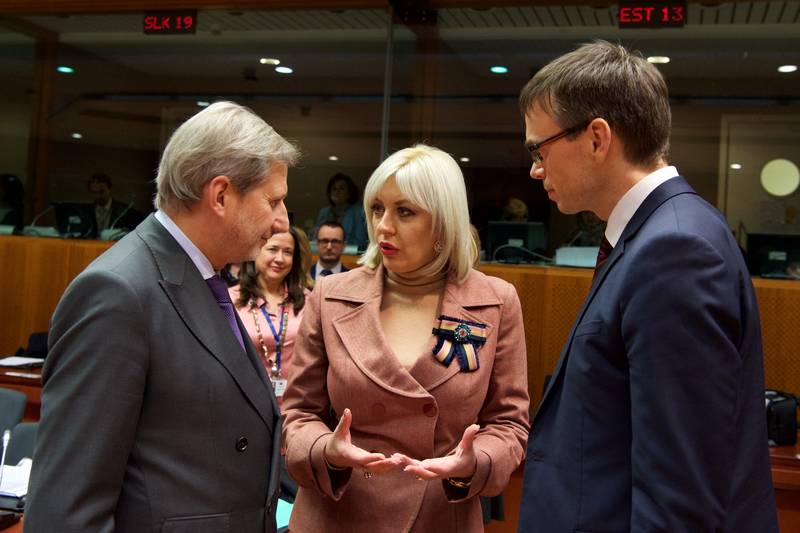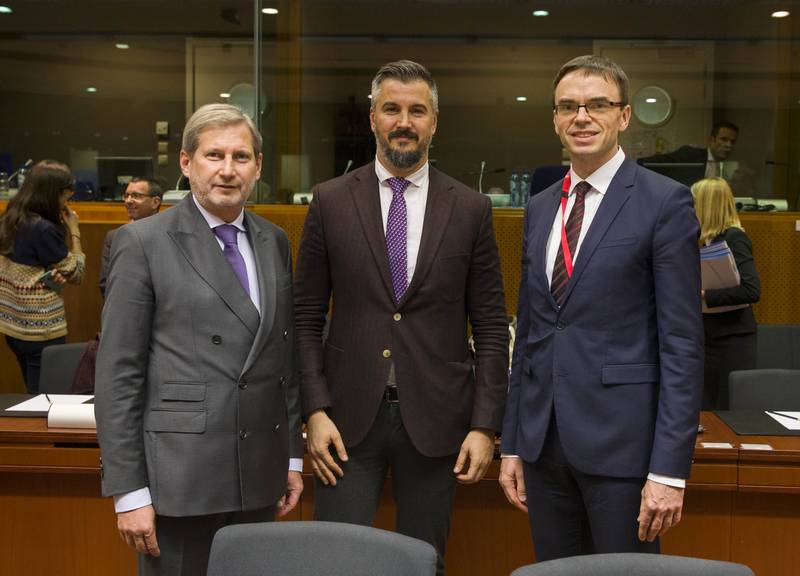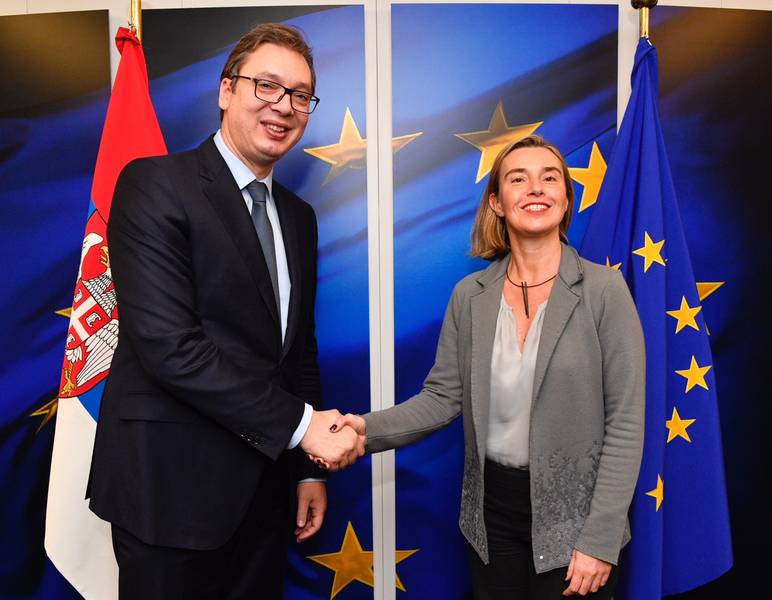EU's Western Balkan Dilemma - the Trickiest Task in 2018
Adelina Marini, January 14, 2018
 Last year (2017) was not the year of the Western Balkans, as analyses can be read. This was the year of the EU's awakening to this volatile region in its immediate neighbourhood, and the realisation that it is of strategic importance to member states in time of a renewed geopolitical race. 2017 began with the surprising recognition of the High Representative of the European Union for Foreign and Security Policy Federica Mogherini (Italy, Socialists and Democrats) that she was not aware of the scale of tensions in the region. She established this during her tour there last spring. The visit, as well as the reversal of political direction in Macedonia, created new hopes that the region is not yet completely lost to the EU and vice versa - that the Union is not yet completely lost to the region.
Last year (2017) was not the year of the Western Balkans, as analyses can be read. This was the year of the EU's awakening to this volatile region in its immediate neighbourhood, and the realisation that it is of strategic importance to member states in time of a renewed geopolitical race. 2017 began with the surprising recognition of the High Representative of the European Union for Foreign and Security Policy Federica Mogherini (Italy, Socialists and Democrats) that she was not aware of the scale of tensions in the region. She established this during her tour there last spring. The visit, as well as the reversal of political direction in Macedonia, created new hopes that the region is not yet completely lost to the EU and vice versa - that the Union is not yet completely lost to the region.
Germany's Berlin Process initiative, with which interested member states are trying to support the enlargement process focusing mainly on economic, trade and transport links, tried to bring a strong impetus to the integration process during the summer. The problem is, however, that the situation both in the EU itself and in the region as well as globally is radically different for the models applied by the Union.
New Energy in an Old Machine
By the end of 2017 European feelings had cooled again, as could be felt during the intergovernmental conferences with Serbia and Montenegro in early December. The reason for the cooling is that the EU is constantly confronted with the same problem - no matter how engaged it is with the region, the political class in its countries does not give in to Europeanisation. This shows that the current enlargement formula is too old and inadequate in many respects - both in terms of the new geopolitical times and the consequences of the fact that the EU has lost hold of the process, lost its transformative power, and has changed significantly and is still changing, quite quickly at that. All this requires a radical change in the approach to one of the most important parts of the European foreign policy - enlargement.
In February, the European Commission is expected to publish a new strategy, but before it is even finished, a few very wrong messages came from the Union, suggesting that it is possible that the Commission might miss the momentum once more. The first wrong step was taken in September when, after Jean-Claude Juncker's (Luxembourg, EPP) annual address on the state of the Union, the Commission published its intentions for 2018, including the plan for Serbia and Montenegro to be ready for membership by 2025. This is wrong on many levels.
Firstly, the year. In all of the Commission's plans, 2025 is given as the deadline for the comprehensive reform of the EU, which includes deepening integration in the Eurozone, defence, foreign policy, common budget, and the institutions. In other words, in 2025, the construction of the new floor of the EU building will be completed - a process that has become rarer and more difficult since the Union expanded to 28 members. The last major reform of the Union was 10 years ago, it lasted for as long, and ended with a new treaty that came into force on 1 December 2009. It is possible for Reform "2025" to pass without a new treaty, despite the fact that French President Emmanuel Macron insists on a new treaty. In fact, whether there will be a treaty does not matter because by using previously unused provisions of the Lisbon Treaty a sufficiently large scale can be achieved, as the case in defence shows.
Therefore, the inclusion of only Serbia and Montenegro within this deadline means that the Union will close for the next 10 or more years, which is a disastrous message to the other Western Balkan countries, much more dangerous than the notorious statement of EC President Jean-Claude Juncker that by the end of his mandate there will be no new enlargement. Federica Mogherini and the European Commissioner for the European Neighbourhood Policy and Negotiations on the EU Expansion Johannes Hahn (Austria, EPP) have repeatedly insisted that the process will not only stop in Serbia and Montenegro and that the new enlargement strategy will give everyone a chance, according to their merits.
 Another problem with the Commission's message is that Serbia and Montenegro are treated as the most advanced just because they have opened the most negotiating chapters, but this has long meant nothing. Until now, the enlargement process has been adapted consistently but not radically after the big-bang enlargement of 2004 and 2007. Thanks to the accession of Bulgaria and Romania into the EU with the special Cooperation and Verification Mechanism, the negotiation process was tightened for Croatia. More serious changes occurred for the next in the queue when the EC decided to first push ahead with chapters covering the rule of law, and later introduced a version of the European semester for the candidate countries.
Another problem with the Commission's message is that Serbia and Montenegro are treated as the most advanced just because they have opened the most negotiating chapters, but this has long meant nothing. Until now, the enlargement process has been adapted consistently but not radically after the big-bang enlargement of 2004 and 2007. Thanks to the accession of Bulgaria and Romania into the EU with the special Cooperation and Verification Mechanism, the negotiation process was tightened for Croatia. More serious changes occurred for the next in the queue when the EC decided to first push ahead with chapters covering the rule of law, and later introduced a version of the European semester for the candidate countries.
The tuning of the negotiation process without a comprehensive reassessment of the enlargement process gave no results for a couple of reasons. The first is that it continued to be too formal. Secondly, it does not take into account the specificities and problems of the six Balkan countries, as well as the commitments made by member states or the EU as a whole to some of them after the end of the wars in the former Yugoslavia. Thirdly, the process does not take into account the changes that happen in the EU itself and does not adapt to them, whereas these changes are already having an impact in the region.
And, quite naturally, the result is ugly. There is almost no untreated wound from the early 1990s that is not inflamed. The return of nationalism to Europe has not spared these countries where it has never been eradicated or condemned, and therefore it is felt most painfully and is most dangerous. The slippage to illiberalism of some of the new members of the EU goes in parallel with the Western Balkans, where it is again at a much higher gear, which can be explained by the fact that in these countries there has never been democracy, liberal values are completely alien, there has never been a rule of law, the economy is still not based on market, and for that reason the governance degenerates with much greater ease.
Brexit is easily used by the Eurosceptic circles in the candidate states as a justification for the lack of progress on the European pathway, which in fact means lack of progress in implementing reforms. This leads to even more poverty, more hostility and nationalism and more instability. The six states are suffering from large debts (not all of them), huge unemployment, strong state interference, dependence on foreign investment, huge levels of non-performing loans, unpredictable legal environment, unclear property rights, lack of regional connectivity and trade barriers among the six.
Once the Commission has said A, it must also say B
The EC will make a big mistake if it gives false hopes to the societies in these countries in the form of dates, or declares its intentions with the hollow phrase "European perspective". To be adequate, the EU's new enlargement strategy must go from the inside (EU) to the outside (Western Balkans). What does this mean?
The event of 2017 was the Commission's decision to start a process of blocking Poland's membership in the EU because of the systematic undermining of the rule of law by the highly conservative government in Warsaw. This is an unprecedented decision that has the potential to shake the Union fundamentally and lead to the catharsis the Union has long needed. The triggering of Article 7 of the Lisbon Treaty is a significantly more powerful quake for the Union than Brexit. When it was set up, the pan-European mechanism for protection of the rule of law seemed impotent because it placed too  many obstacles to its effectiveness. Now, however, the stars have started to line up, suggesting that Poland can be sacrificed in order to preserve the integrity and morality of the Community.
many obstacles to its effectiveness. Now, however, the stars have started to line up, suggesting that Poland can be sacrificed in order to preserve the integrity and morality of the Community.
Why did this happen? After the election of Emmanuel Macron as President of France in the spring of 2017, the atmosphere in the EU changed significantly. Since his first participation in the European Council, Mr Macron has made it clear that he will not tolerate authoritarian regimes. He said this in the presence and with the full support of German Chancellor Angela Merkel. Moreover, at the December summit, both of them firmly stated that they would support the Commission's actions, which means they would probably vote for the blockade of Poland when the time is right for that. The rule of law, just as euinside predicted at the very beginning of 2017, has become the main challenge for the Union. EC President Jean-Claude Juncker also made it very clear in his annual address in September. Moreover, the EC insists that the new multi-annual EU budget be linked to the rule of law.
European Council President Donald Tusk (Poland, EPP) has also issued strong messages against illiberals. Adding to this the states blocking the accession of Bulgaria and Romania to Schengen because of the non-implementation of the Cooperation and Verification Mechanism benchmarks, we can easily predict that the first step towards freezing Poland's membership, namely the Council's decision that in Poland the rule of law is jeopardised, will be accomplished. This decision requires a qualified majority.
Supporting this is the fact that the review of the EC proposal will happen during the Bulgarian presidency, given that all spotlights are currently focused on Sofia and the government of Boyko Borissov. All international media watch with a spying glass very action or inaction of the government and showcase corruption and organised crime issues, and events in Sofia since the beginning of the year do not make it difficult for foreign correspondents. This will certainly increase the intolerance to illiberals and the funding of their regimes with European taxpayers' money.
But there is one problem and it is in the Commission's behaviour, which is contradictory. On the one hand, it proclaims the rule of law as its top priority, it leads a fierce battle with Poland, but it is obviously softer to Hungary, whose prime minister has publicly announced that he will build an illiberal regime. The Commission furthermore states that there is no real link between Schengen membership and the rule of law, constantly calling for the accession of Bulgaria and Romania despite the sins of their leaders detailed in the annual reports on the Cooperation and Verification Mechanism.
This inconsistency also affects enlargement. One of the unpleasant examples is that the Commission, despite all signals that power in Serbia is authoritarian, continues to support it by opening new chapters, as if the lessons of Turkey's accession process have not been taught at all. At the same time, the Commission is setting conditions for Macedonia for giving a recommendation for the opening of negotiations, and until very recently it issued such a recommendation every year to the previous government, despite the obvious problems.
What needs to change?
The most important issue that the new strategy needs to address is whether the EU wants more illiberals at the Council table, that is, more Orbans, Kaczyńskis, Borissovs and other illiberals and Russian Trojan horses. If the rule of law is really the most important value of the EU, then the Union  needs to put all its energy into it by changing the approach. The opening of negotiation chapters should be frozen until several conditions are met:
needs to put all its energy into it by changing the approach. The opening of negotiation chapters should be frozen until several conditions are met:
1. Implementing everything required by chapters 23 and 24, which means building rule of law, an independent judiciary, anti-high-level corruption bodies, breaking the relationship between the government, media and business. However, reaching this high goal must not lead to closing of these two chapters. On the contrary. Experience has shown that fragile democracies need a lot of time and strong pressure from outside until roots are released and the process becomes irreversible. In addition, the EC must retain its leverage. Blocking the rest of the chapters should not be a problem, as with the presence of the rule of law negotiations on them will go fast and smoothly.
2. Resolving bilateral disputes. Throughout enlargement waves, those who are already inside have always used their membership to blackmail their neighbours to resolve bilateral, often borderline disputes. This practise is terribly vicious, and the EU has long been aware that it is an accomplice to this. The recently inflamed border dispute between Slovenia and Croatia on the border between the two in the Gulf of Piran is a good illustration, but the bitter lesson for the EU came from blocking Macedonia's negotiation process by Greece for an unresolved bilateral dispute over the name of the former Yugoslav republic. This eventually led to the implosion of Macedonia, and last year there was even a danger of an ethnic conflict there. Such a mistake should never be repeated again. Leaked excerpts of the draft strategy show that there is an ambition to solve this problem.
The question is how. If all countries in the region want EU membership, the EU itself also wants them in their ranks, allegedly, then everyone wants the same thing and they have to do it together. The only way to do this is by getting the topic incorporated in the negotiation process. Chapter 35 is the most appropriate. It is currently being used to solve the extremely complex case of Kosovo. In this sense, it is important that the EU itself decides what future it sees for Kosovo, as five members have not yet recognised the independence of the former Serbian province. If there is no such solution, the EU cannot expect Serbia and Kosovo to agree between them without being aware of whether Kosovo's membership is at all possible even if there is a recognition from Belgrade.
Bosnia and Herzegovina is also a very tough case. As euinside wrote, a trilateral dialogue with Serbia, Croatia and the EU's High Representative for Foreign Affairs is needed. The problems in the country are growing constantly, the functioning of the state, and hence its European path, is completely blocked. The country is subject to influences from external players who do not work in the EU's interest. Serbia supports Milorad Dodik's regime in Republika Srpska, and Croatia seeks Turkey's support to protect the interests of the Croatian community in BiH by selling the European interest. Bosniaks also rely on Turkey to push their interests. In general, everyone is looking for a solution on the outside BiH instead of on the inside, and the EU is waiting for answers to a questionnaire.
This must be ended. If Serbia really wants to become a member of the EU, it must work in parallel with building the rule of law on reconciliation with Kosovo and stabilising Bosnia and Herzegovina in cooperation with Croatia and the Bosniaks. In their border dispute, Slovenia and Croatia think that the EU has nothing to do, but here the Union must be particularly unbending in the negotiations on the future multiannual financial framework and clearly state that, besides the rule of law, the neighbourly relations must be in direct dependence on receiving money from the EU budget. It will not appeal to either Zagreb or Ljubljana, but it is an opportunity that should not be missed. Otherwise, these issues will remain unresolved with all the consequences this might have.
It is only after the implementation of points 1 and 2 that new negotiation chapters can be opened. But right from the start, the EU should pay attention to a few very important things:
- Membership in the euro area. Last year was supposed to be key to deepening eurozone integration, but political instability in Germany became an obstacle. Sooner or later, however, integration will pull at great speed. The Commission emphasised year-round that the Euro is the currency of the entire EU, and called upon the countries that have committed to their accession negotiations, to adopt the Euro as quick as possible. In response to the call, Croatia has already begun preparations, and Bulgaria has announced on the official opening of its presidency that it will submit by end-June an application for entry into the currency mechanism (ERMII) that will prepare the country for the adoption of the common currency.
As this is not only a very complicated economic and legal process, but also of great international importance, which is based on a high level of trust, the EU should clarify early enough in the negotiations with the candidate countries which of the Balkan six plan on adopting the Euro, that is, full integration. Brexit significantly changed the atmosphere of the EU, in a direction of no tolerance towards opt-outs, opt-ins, exceptions, rebates and cherry-picking. This means that the candidate countries must be aware of what future is ahead of them and that specific dates for the adoption of the euro should be recorded in their accession treaties in order to avoid the mistake made with the great wave of 2004 and 2007. This will give even greater security and a real "European perspective" to both candidate countries and the EU as a whole.
- European Defence. 2017 can be defined as the year of European defence because, for the first time in its history, the Union has taken a significant step in its integration in a sphere that has so far been a taboo. At present, not all Member States are involved, but this area will continue to develop with priority over the next decade and will even have a dedicated program in the next multiannual budget. This requires the candidate countries to position themselves very strongly in the geopolitical coordinate system and decide whether to participate in the EU's common defence, in addition to the European foreign policy.
With the current accession rates, the countries of the Western Balkans have chances, almost as much as Turkey had a few years ago. From an economic point of view, they are too far away from the EU, and they are even farther in terms of values. If the Union does not change the paradigm of the process, it will lose the area. And if it fails to tighten the situation in its peripheral member states, the loss of the region will lead to the undermining of the Union itself.
What can the Bulgarian Presidency bring?
 Bulgaria is the focal point of all these intra-European and Western Balkan problems, not only because it is at the external border between the EU and the Western Balkans. Bulgaria is a much tougher case than Poland and Hungary because it has failed to create rule of law and a solid democracy, as have existed in Poland and Hungary for almost a decade. When Poland took the rotating presidency, it was said that this was the first country of the southeastern flank to successfully complete the transition from communism to a European liberal democracy. Alas, the coming of power of the Law and Justice Party has shown that the sustainability of democracy is still fragile. This can be established by making a parallel with the US, where an illiberal is in power, but state institutions are so independent that they are virtually the state's immune system and are resisting.
Bulgaria is the focal point of all these intra-European and Western Balkan problems, not only because it is at the external border between the EU and the Western Balkans. Bulgaria is a much tougher case than Poland and Hungary because it has failed to create rule of law and a solid democracy, as have existed in Poland and Hungary for almost a decade. When Poland took the rotating presidency, it was said that this was the first country of the southeastern flank to successfully complete the transition from communism to a European liberal democracy. Alas, the coming of power of the Law and Justice Party has shown that the sustainability of democracy is still fragile. This can be established by making a parallel with the US, where an illiberal is in power, but state institutions are so independent that they are virtually the state's immune system and are resisting.
Bulgaria has many Balkan problems - it is highly oligarchized, it is dependent on Russia and Turkey, and the media environment is just as bad as, for example, in Serbia. The government in Sofia has set itself the goal of keeping the EU's attention on the Western Balkans. The state of Bulgaria shows that the right approach of the EU toward enlargement would be precisely from the inside out. There is no stronger message to candidate countries than the EU to address its internal problems resolutely and unwaveringly. Even at the cost of serious shocks. This is a low price against what Europe paid with much blood and ruin at the beginning of the 20th century. The countries of the Western Balkans also shed a lot of blood and experienced a lot of ruin at the end of that same century. It is time for them to feel the taste of the EU. From the inside.
 Bakir Izetbegovic, Andrej Plenkovic | © Council of the EU
Bakir Izetbegovic, Andrej Plenkovic | © Council of the EU Aleksandar Vucic, Recep Tayyip Erdogan | © Serbian Presidency
Aleksandar Vucic, Recep Tayyip Erdogan | © Serbian Presidency Jean-Claude Juncker, Zoran Zaev | © European Commission
Jean-Claude Juncker, Zoran Zaev | © European Commission